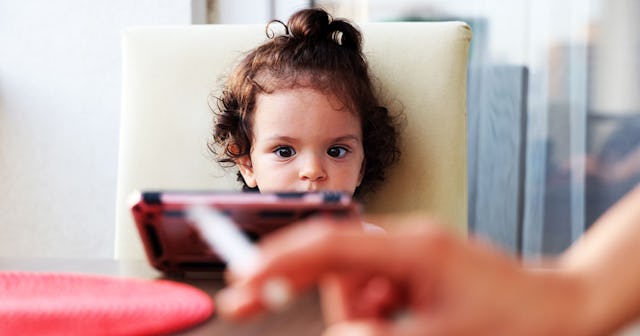If You Smoke, Your Kids Are More Likely To Smoke Too

I was a kid in the ’80s. Back then, everyone smoked. Whether you were at home, in a restaurant, or even in the car, there were people dragging on cigarettes everywhere that you went. We really didn’t think anything of it. Sure, they told us in school that we shouldn’t smoke, but it didn’t seem like a big deal.
As a teenager in the ’90s, I started smoking. My dad was a smoker, and although my mother hated that I did it, I was allowed to smoke in the house and basically wherever I went. But I wasn’t an anomaly; plenty of my friends’ parents smoked and they became smokers too.
The thought of that now makes me want to throw up. My dad kicked the habit, and I quit when I got pregnant. I have now been a nonsmoker longer than I was a smoker, and my kids have never seen me with a cig hanging from my lips. I am so grateful for that. Smoking totally grosses me out. It is certainly taboo now, yet millions of Americans still smoke.
According to the CDC, “In 2019, nearly 14 of every 100 U.S. adults aged 18 years or older (14.0%) currently* smoked cigarettes. This means an estimated 34.1 million adults in the United States currently smoke cigarettes” More than 16 million Americans live with a smoking-related disease.
That is a lot of smokers and a tragic amount of smoking illnesses. All that could be prevented if people just crushed those packs for good. Sadly, a new study out of the UK has found that smokers are passing the habit along to their kids.
The BBC is reporting that The Better Health Smoke Free campaign found that 4.9% of teenagers whose parents smoke have started smoking themselves. This is compared to only 1.2% of teenage smokers whose parents do not smoke. That number is bewildering. Why are we passing this on to our kids?
Yes, smokers are probably more permissive than non smokers. They see this as a habit that they have, although they most certainly know the risks; yet they see their children smoking and don’t stop them. Perhaps they are more understanding of the addictive aspect as nicotine has ahold of them as well. Or, maybe they just don’t know. It is difficult to believe that any parent, smoker or nonsmoker, would really want their kids to take up smoking.
Here are some staggering statistics from the CDC about teenage smoking in the US.
- Of those who use tobacco, they almost always start as adolescents
- Nine out of 10 adult smokers had their first cigarette by age 18, while 99% have tried smoking by age 26
- There are 1,600 youth smokers trying their first cigarette every day in the US, and 200 become habitual daily smokers
In 2020, it was reported that 85% of high school students reported the use of a flavored tobacco while 74% of middle school students admitted the same
Teenage tobacco use is not limited to cigarette smoking. The recent introduction of E-cigarettes, once thought to be a safe alternative to cigarette smoking, has brought even more adolescents to daily use of nicotine products.
The CDC also reports that in 2020, 1 in every 20 middle school students reported having tried an E-cigarette, which thankfully was a decrease from 2019, but still too many. One in every 5 high school students reported the same, 19.6%, which was also down from 25.5% in 2019.
The numbers of E-cigarette users may be down, but we need those numbers to go down even further. With many states increasing the age to purchase nicotine products from 18 to 21, we are seeing things move in the right direction.
What will it take to get parents to stop smoking? We know the risks; we have seen the illness and the devastating deaths. Perhaps it will be a new year’s resolution to finally give up smoking for good.
Britain’s Health minister Maggie Throup told the BBC that she hoped this new information will give parents the impotence to stop smoking and take on a healthier lifestyle, not just for themselves, but also for the sake of future generations.
“We know many people make a quit attempt in January, and while there are so many good reasons to stop smoking for yourself, we hope that this new campaign — by highlighting the inter-generational smoking link with parents influencing their children — will be the added motivation many need to ditch the cigarettes for good this year,” she said.
Adults need to set the example. Kids are impressionable. They are also rebellious and can be quit cunning. We need to keep cigarettes and other nicotine products out of their hands. It is also always smart to speak to our kids honestly and frankly about the risks associated with smoking and that they can cause illness and ultimately death. If you have struggled with a smoking addiction, you don’t want the same for your kids.
This article was originally published on